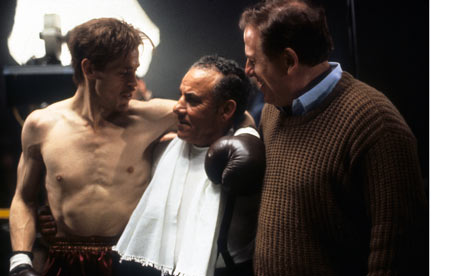
Salamo Arouch, who has died at 86, was a Jew from Salonika who survived Auschwitz by fighting for the entertainment of Nazi officers. His life depended upon his ability to reduce other boxers to a bloody pulp. Had he not done so, he would have met the fate shared by more than 200 of his opponents, and been summarily shot or despatched to the gas chambers. The murder of his family, and the urge to tell the rest of the world what had happened to them, gave him this extraordinary, troubling variant on the will to survive.
Arouch was a Sephardic Jew whose dock-worker father encouraged his son's middleweight boxing. His footwork brought him the nickname "the Ballet Dancer", a potential place in the Greek Olympic team and middleweight supremacy in the Balkans. But in 1943, the Germans invaded Greece, and Arouch's family were among those rounded up and sent to Auschwitz.
His mother and sisters were in the group sent first. Spotting a friend when he arrived, Arouch asked: "Where are the others?" When told that they were dead, all gassed and burned, he refused to believe him, believing the man to be crazy. His forearm duly tattooed with the number 136954, Arouch soon learned that the horrors were real. At one assembly of the prisoners, a German officer demanded to know whether any were boxers. Arouch hung back but was pushed forward by friends.
So began twice-weekly warehouse bouts, often preceded by Gypsy juggling and dancing dogs, while officers staked their bets. Arouch faced up to prisoners who were often bigger than him, knowing that he had to keep on going.
His status as a fighter brought him clerical and kitchen work, and a reprieve from the gas chambers. Perhaps the closest that he came to death was at the hands of a professional boxer named Klaus Silber, who, far heavier than his opponent, almost knocked him out. Both tumbled from the ring before recovering. Arouch was the victor, and Silber vanished forever.
As Primo Levi wrote of the camp in If This Is a Man: "The Greeks have been reduced to very few by now, but they have made a contribution of the first importance to the physiognomy of the camp and to the international slang in circulation. These few survivors from the Jewish colony of Salonika, with their two languages, Spanish and Greek, and their numerous activities, are the repositories of a concrete, mundane, conscious wisdom in which the traditions of all the Mediterranean civilisations blend together.
"That this wisdom was transformed in the camp into the systematic and scientific practice of theft and seizure of possessions and the monopoly of the bargaining market, should not make one forget their aversion to gratuitous brutality, their amazing consciousness of the survival of at least a potential human dignity."
Arouch's father and brother did not survive the war. His father was executed when he became ill, and his brother was shot for refusing to extract gold from the teeth of the gassed. After liberation early in 1945, Arouch visited other camps to look for his family. At Belsen he met 17-year-old Marta Yechiel, also from Salonika, and sole survivor of her family. They married in November and moved to Palestine, where Arouch took part in the 1948 war, and the couple settled in the new state of Israel.
Later he developed a shipping and moving business in Tel Aviv. In 1988 he returned to Auschwitz for three months, as an adviser on Triumph of the Spirit (1989), the film based on his life, in which he was played by Willem Dafoe. Directed by Robert Young, this film was the first to be shot on location there. Nobody, from the armchair of hindsight, can know what they would have done in Arouch's place.
In 1994 Arouch suffered a stroke, and was cared for by his wife, who survives him, with their four children.
• Salamo Arouch, boxer and freight operator, born 1923; died 26 April 2009

